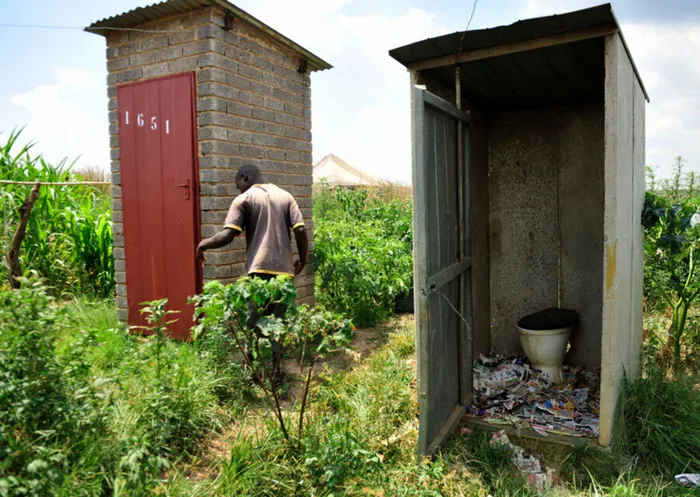Conditional grants to improve infrastructure in schools

Picture: Bongiwe Mchunu (ANA Files) – A court battle ensued for safe toilets in Limpopo schools following the 2014 tragic death of learner Michael Komape in a pit latrine.
By Abel Semosa
Historically, in black communities, the school infrastructure was not given attention because black people were excluded from everything by the Apartheid government under the Bantu Education system. The new dispensation in South Africa gave hope to black people that their dignity would be restored under the government of the African National Congress (ANC).
However, that turned out to be a fallacy. Instead of rebranding the education system and building new infrastructure, the ANC government has worsened the poor conditions in public schools.
Measures have been put in place to combat the dilapidated infrastructure in public schools. National Treasury has introduced conditional Education Infrastructure Grants (EIG) to speed up the process of providing new infrastructure (among others, replacing pit toilets and building classrooms) but implementation has been slow.
According to the Department of Basic Education (DBE) the EIG aimed to:
“Fund infrastructure through a conditional grant enables the national department to ensure the delivery and maintenance of education infrastructure in a co-ordinated and efficient manner, consistent with national norms and standards for school buildings.”
The conditional education grant sought to accelerate construction, maintenance, upgrading and rehabilitation of new and existing infrastructure in education including district and circuit accommodation, enhance capacity to deliver infrastructure in education and address damages to infrastructure.
Over the past years, there have been tragic incidents of learners falling into pit latrines in public schools. These pit toilets pose a threat to learners mostly in rural areas and the DBE should prioritise removing them in schools.
According to the South African Human Rights Commission (SAHRC), 3,297 public schools in South Africa still use pit toilets and risk the lives of the learners. In 2014, Michael Komape in Limpopo drowned in a pit latrine, and in 2018, Lumka Mthetwa also died after falling into a pit toilet in Eastern Cape. Earlier this year, the body of a four-year-old girl was found in a pit toilet in Eastern Cape.
This is a violation of learners’ rights. In Komape versus DBE, the court indicated that the right to educations entails safe, hygienic and dignified sanitation facilities.
The conditional education grant is not the only measure put in place to accelerate the maintenance and construction of existing and new infrastructure in education. The DBE also receives funding through the Accelerated School Infrastructure Delivery Initiative (ASIDI), under the Schools Infrastructure Backlog Grant (SIBG) that aims to eliminate infrastructure backlogs in schools.
The Cyril Ramaphosa administration has implemented Sanitation Appropriate for Education initiative and one of its purposes is eradication of pit toilets. Despite all these measures and grants provided, the government officials that are being tasked with these responsibilities of making sure the education infrastructure are maintained and renovated have failed dismally.
According to the portfolio committee on DBE, the education since the introduction of Infrastructure Delivery Initiative (ASIDI, SIBG), they have spent 70 percent of the budget allocated to the initiative but with no results to show.
Money has been used but there is no service delivery in schools. Provision of educational grants it is a good initiative, but it requires government officials that are determined to make changes and who are more concerned about restoring the dignity of black people.
Based on the Auditor General’s reports on DBE, there is a lot of ongoing corruption and irregular expenditures. Unfortunately, no one is being held accountable for the corrupt actions and there is a lack of oversight by the DBE at national level.
The portfolio committee on DBE and the Auditor General should step in by making a follow up with the department to ensure that remedial actions and consequence management processes are implemented. Nobody is held accountable for their actions and if it continues, the dilapidated school infrastructure will further deteriorate.
The department must also enhance oversight over the performance of the grants and their progress. There needs to be a thorough investigation a full review on infrastructure delivery initiatives and programmes, what has been delivered and what has happened to implementing agents that have not delivered but received money.
The DBE should assist provincial departments in planning and financial management. For instances, the Eastern Cape DBE has failed to deliver necessary infrastructure in schools because they lack financial management and planning.
The provincial DBE has forfeited R100 million of its infrastructure grant that was meant for school maintenance, renovation and construction. Yet, most schools in the province do not meet the minimum infrastructure standards for South Africa’s public schools as prescribed by the South African Schools Act 84 of 1996.
The national DBE should get involved in the planning and providing guidance to the MECs. Even in Mpumalanga, the DBE forfeited R311,000 of the infrastructure grant budget because they did not spend it on time. The money would have achieved a lot if they had a plan of action.
Abel Semosa is a political analyst and holds an MA, majoring in Political Science, from University of Limpopo